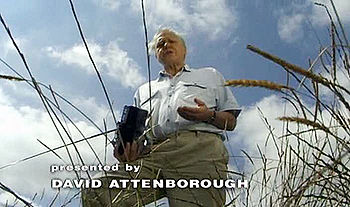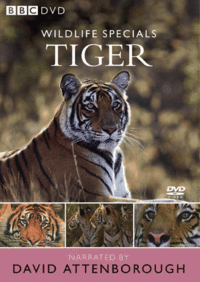- BBC Wildlife Specials
-
BBC Wildlife Specials Genre Nature documentary Presented by David Attenborough Narrated by David Attenborough Composer(s) Various Country of origin United Kingdom Language(s) English No. of episodes 21 Production Producer(s) Neil Nightingale
Keith Scholey
John DownerRunning time 50 or 60 minutes Production company(s) BBC Natural History Unit
John Downer Prods.Broadcast Original channel BBC One Picture format Before 1999: 576i (4:3)
Since 1999: 576i (16:9)Audio format stereo Original run 14 April 1995 – 23 April 2008 The BBC Wildlife Specials are a series of nature documentary programmes commissioned by BBC Television. The Wildlife Specials began with a pilot episode in 1995. A further 15 programmes were made over the next decade, and more recently the format has been expanded into two short series. The earlier programmes were produced in-house by the BBC's specialist Natural History Unit, but the more recent Spy in the... titles are made by the independent producer John Downer Productions. Each Wildlife Special is narrated by David Attenborough (except for the 2010 Polar Bear: Spy on the Ice which was narrated by David Tennant) and features one of the most high-profile animals of the natural world.
"The world's leading natural history filmmakers meet the world's most charismatic animals"
— BBC tagline
Contents
Broadcast and production history
The Wildlife Specials have always been broadcast on BBC One. Following a pilot episode on the great white shark in 1995, a sequence of six further programmes were transmitted in 1997, screened as part of the Natural History Unit's 40th anniversary celebrations. Later programmes were screened on an intermittent basis, typically at holiday times to attract a family audience. Viewing figures for the 1997 series peaked at 9.5 million viewers for the polar bear special.
Although they are frequently filmed subjects, the Wildlife Specials incorporate the latest filming techniques and scientific research to present the creatures in a new light, as described in the examples below:
- The eagle film uses aerial photography to capture dramatic scenes of the birds, including dropping tortoises from a great height to smash their shells open. 15 of the world's 60 species of eagle were filmed for this programme.
- The leopard film uses infra-red cameras to reveal previously unseen nocturnal activity of the cats hunting baboons.
- In the polar bear film, the producer and cameraman were trapped on an ice floe for 20 hours, but managed to capture the first scenes of new-born cubs in the den.
- Groundbreaking high-speed photography, x-ray imaging and miniature cameras attached to the heads of snakes brought new and revealing behaviour.
- A specially constructed, remote-controlled airship was used to capture aerial footage of humpback whales as they breached, scooping thousands of fish into their mouths
- The programme on lions was the first to be commissioned from an independent production company. The filmmakers at John Downer Productions used their previous experience from ground-breaking films such as In-Flight Movie to develop a range of mobile, remote-controlled cameras. "Boulder cam" was disguised as a rock and enabled the first footage from inside a pride's den to be captured. This technique was developed further for the later Spy in the... programmes on elephants and bears.
- For the 2-part special Trek – Spy on the Wildebeest, cameras disguised as tortoises and crocodiles and an aerial camera christened "Dragonfly Cam" were developed.
- In Tiger – Spy in the Jungle, trained elephants carried and deployed "Trunk Cam" and "Tusk Cam", whilst "Log Cam" gathered unique footage of India's jungle wildlife.
Programmes
A list of programme titles with original broadcast date:
- Great White Shark: The True Story of Jaws (1995-04-14)
- Polar Bear: The Arctic Warrior (1997-11-26)
- Crocodile: The Smiling Predator (1997-12-03)
- Leopard: The Agent of Darkness (1997-12-10)
- Eagle: The Master of the Skies (1997-12-17)
- Humpback Whale: The Giant of the Oceans (1997-12-24)
- Wolf: The Legendary Outlaw (1997-12-31)
- Tiger: The Elusive Princess (1999-04-04)
- Lions: Spy in the Den (2000-12-03)
- Grizzly: Face to Face (2001-04-08)
- Gorillas: On the Trail of King Kong (2002-02-03)
- Serpent: Through the Eyes of the Snake (2002-04-10)
- Killer Whale (2003-04-09)
- Elephants: Spy in the Herd (2003-07-20)
- Smart Sharks: Swimming With Roboshark (2003-08-03)
- Bears: Spy in the Woods (2004-11-30)
- Trek: Spy on the Wildebeest two-part series
- Episode 1: "The Journey" (2007-01-14)
- Episode 2: "The Crossing" (2007-01-21)
- Tiger: Spy in the Jungle three-part series
- Episode 1 (2008-03-30)
- Episode 2 (2008-04-06)
- Episode 3 (2008-04-13)
- Polar Bear: Spy on the Ice (2010-12-29)
Awards
- Leopard won the Award for Innovation at the 1998 Jackson Hole Wildlife Film Festival
- Polar Bear won the Best Factual Photography award at the 1998 BAFTAs
- Tiger won the Best Factual Photography award at the 2000 BAFTAs
- A scene of a python swallowing an antelope whole, from Serpent, won Best Factual Moment at the BBC's 2002 TV Moments awards show
Merchandise
To date, four of the early Specials have been released on DVD on 23 May 2004 both individually and as a box set (BBCDVD1580); they are Eagle (BBCVD1481), Serpent (BBCDVD1482), Leopard (BBCDVD1483) and Tiger (BBCDVD1485).[1] The first eight Specials were also previously released on VHS.
Many of the later Specials have also been given DVD releases. Lions: Spy in the Den, Elephants: Spy in the Herd and Bears: Spy in the Woods were collectively released as The Spy in the... Collection (BBCDVD1996) on 2 October 2006. Trek: Spy on the Wildebeest (BBCDVD2760) and Tiger: Spy in the Jungle (BBCDVD2759) were released on individual DVDs on 9 June 2008.
To accompany the 1997 Specials, a hardcover book The BBC Natural History Unit's Wildlife Specials (ISBN 1-900-72416-2) was published by Trident Press on 10 November 1997 with a foreword by David Attenborough, an introduction by series producer Keith Scholey, and a chapter on each of the six animals by the individual programme producers.
References
- ^ "Four Wildlife Specials Released on Individual DVDs". BBC Press Office. 28 May 2004. http://www.bbc.co.uk/pressoffice/bbcworldwide/worldwidestories/pressreleases/2004/05_may/wildlife_specials.shtml.
External links
David Attenborough's television and radio series The Life series Life on Earth (1979) · The Living Planet (1984) · The Trials of Life (1990) · Life in the Freezer (1993) · The Private Life of Plants (1995) · The Life of Birds (1998) · The Life of Mammals (2002) · Life in the Undergrowth (2005) · Life in Cold Blood (2008)Other TV series Zoo Quest (1954–1963) · The People of Paradise (1960) · The Miracle of Bali (1969) · The Tribal Eye (1975) · Wildlife on One (1977) · The First Eden (1987) · Lost Worlds Vanished Lives (1989) · BBC Wildlife Specials (1995–2008) · State of the Planet (2000) · The Blue Planet (2001) · Planet Earth (2006) · Are We Changing Planet Earth? (2006) · Nature's Great Events (2009) · Life (2009) · First Life (2010) · Madagascar (2011) · Frozen Planet (2011)DVD collections Great Wildlife Moments (2003) · Attenborough in Paradise (2005) · The Life Collection (2005) · Life on Land (2008)Radio David Attenborough's Life Stories (2009–2011)Categories:- BBC television documentaries
- Documentary films about nature
- 1995 British television programme debuts
- 2008 British television programme endings
- 1990s British television series
- 2000s British television series
Wikimedia Foundation. 2010.


